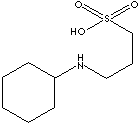PRODUCT IDENTIFICATION

CLASSIFICATION
PHYSICAL AND CHEMICAL PROPERTIES
REFRACTIVE INDEX
>100 C
GENERAL DESCRIPTION & APPLICATIONS
- Bicarbonate buffer; a buffer system composed of bicarbonate ions and dissolved carbon dioxide; in the body, this system is an important factor in determining the pH of the blood as the concentration of bicarbonate ions is regulated by the kidneys and of carbon dioxide by the respiratory system.
- Cacodylate buffer; one containing an organic arsenical salt, used in preparing fixatives for electron microscopy.
- Phosphate buffer, a buffer system composed of KH2PO4 and Na2HPO4; in the body, it is important in regulating the pH of the renal tubular fluids; when 0.025 molal (equimolal of the potassium and sodium salts), the pH is 6.865 at 25 C.
- Protein buffer, a buffer system involving proton donor and proton acceptor groups of the amino acid residues of proteins.
- TRIS buffer (tromethamine): an amine base used intravenously as an alkalizer for the correction of metabolic acidosis. The pH values of all buffers are temperature- and concentration-dependent. For Tris buffers, pH increases about 0.03 unit per C temperature decrease, and decreases 0.03-0.05 unit per ten-fold dilution.
- Veronal buffer; a barbital buffer commonly used in the preparation of fixatives for electron microscopy.
APPEARANCE
99.0% min
148 - 152 C
UV
A: <0.02 at 280nm (0.1M in water)
LOSS ON DRYING
5.0% max
HEAVY METALS
5ppm max
CLARITY
clear
OPERATING pH
Fe
1ppm max
BIOLOGICAL BUFFERS
|
Buffers |
CAS # |
Useful pH Range |
pKa |
| N-(2-Acetamido)-2-aminoethanesulfonic acid | |||
|
ACES |
7365-82-4 |
6.1 - 7.5 |
6.8 |
| N-(2-(Acetamido)imino)diacetic acid | |||
|
ADA |
26239-55-4 |
6.0 - 7.2 |
6.59 |
| 2-Amino-2-methyl-1-propanol | |||
|
AMP |
124-68-5 |
9.0 - 10.5 |
9.70 |
| 2-Amino-2-methyl-1,3-propanediol | |||
|
AMPD |
115-69-5 |
7.8 - 9.7 |
8.80 |
| N-(1,1-Dimethyl-2-hydroxyethyl)-3-amino-2-hydroxypropanesulfonic acid | |||
|
AMPSO |
68399-79-1 |
8.3 - 9.7 |
9.00 |
| N,N-Bis(2-hydroxyethyl)-2-aminoethanesulfonic acid | |||
|
BES |
10191-18-1 |
6.4 - 7.8 |
7.09 |
| N,N-Bis(2-hydroxyethyl)glycine | |||
|
Bicine |
150-25-4 |
7.6 - 9.0 |
8.3 |
| 2,2'-(Propane-1,3-diyldiimino)bis[2-(hydroxymethyl)propane-1,3-diol] | |||
|
Bis-Tris Propane |
64431-96-5 |
6.3 - 9.5 |
(1) 6.8, (2) 9.0 |
| 2-[Bis(2-hydroxyethyl)imino]-2-(hydroxymethyl)-1,3-propanediol | |||
|
Bis-Tris |
6976-37-0 |
5.8 - 7.2 |
6.50 |
| 2-[Bis(2-hydroxyethyl)imino]-2-(hydroxymethyl)-1,3- propanediol Hydrochloride | |||
|
BIS-TRIS HCl |
124763-51-5 |
5.8 - 7.2 |
6.50 |
| 4-(Cyclohexylamino)-1-butanesulfonic acid | |||
|
CABS |
161308-34-5 |
10.0 - 11.4 |
10.70 |
| 3-(Cyclohexylamino)-1-propanesulfonic acid | |||
|
CAPS |
1135-40-6 |
9.7 - 11.1 |
10.40 |
| 3-(Cyclohexylamino)-2-hydroxy-1-propanesulfonic acid | |||
|
CAPSO |
73463-39-5 |
8.9 - 10.3 |
9.60 |
| 2-(Cyclohexylamino)ethanesulfonic acid | |||
|
CHES |
103-47-9 |
8.6 - 10.0 |
9.49 |
| 3-[N-Bis(hydroxyethyl)amino]-2-hydroxypropanesulfonic acid | |||
|
DIPSO |
68399-80-4 |
7.0 - 8.2 |
7.60 |
| 4-(2-Hydroxyethyl)piperazine-1-propanesulfonic acid | |||
|
EPPS |
16052-06-5 |
7.3 - 8.7 |
8.00 |
| N-Glycylglycine | |||
|
Gly-Gly |
556-50-3 |
7.5 - 8.9 |
8.20 |
| N-(2-Hydroxyethyl)piperazine-N'-(4-butanesulfonic acid) | |||
|
HEPBS |
161308-36-7 |
7.6 - 9.0 |
8.30 |
| 4-(2-Hydroxyethyl)-1-piperazineethanesulfonic acid | |||
|
HEPES |
7365-45-9 |
6.8 - 8.2 |
7.55 |
| 4-(2-Hydroxyethyl)-1-piperazineethanesulfonic acid Hemisodium salt | |||
|
HEPES Hemisodium |
103404-87-1 |
8.2 |
7.55 |
| 4-(2-Hydroxyethyl)-1-piperazineethanesulfonic acid Potassium salt | |||
|
HEPES potassium |
82207-62-3 |
6.8 - 8.2 |
7.55 |
| 4-(2-Hydroxyethyl)-1-piperazineethanesulfonic acid Sodium salt Hydrate | |||
|
HEPES Sodium Hydrate |
75277-39-3 |
6.8 - 8.2 |
7.5 |
|
Imidazole |
|||
|
Imidazole |
288-32-4 |
6.2 - 7.8 |
|
| 2-(4-Morpholino)ethanesulfonic acid | |||
|
MES |
4432-31-9 |
5.5 - 6.7 |
6.2 |
| 2-(4-Morpholino)ethanesulfonic acid Sodium salt | |||
|
MES sodium |
71119-23-8 |
5.5 - 6.7 |
6.2 |
|
MOBS |
115724-21-5 |
6.9 - 8.3 |
7.60 |
| 3-N-Morpholino propansulfonic acid | |||
|
MOPS |
1132-61-2 |
6.5 - 7.9 |
7.2 |
| 3-N-Morpholino propansulfonic acid Hemisodium salt | |||
|
MOPS Hemisodium |
117961-20-3 |
6.5 - 7.9 |
7.2 |
| 3-N-Morpholino propansulfonic acid Sodium salt | |||
|
MOPS Sodium |
71119-22-7 |
6.5 - 7.9 |
7.2 |
| 3-Morpholino-2-hydroxypropanesulfonic acid | |||
|
MOPSO |
68399-77-9 |
6.2 - 7.6 |
6.90 |
| Piperazine-N,N'-bis(2-ethanesulfonic acid) | |||
|
PIPES |
5625-37-6 |
6.1 - 7.5 |
6.8 |
| Piperazine-N,N'-bis(2-ethanesulfonic acid) Dipotassium salt | |||
|
PIPES Dipotassium |
108321-27-3 |
6.1 - 7.5 |
6.8 |
| Piperazine-N,N'-bis(2-ethanesulfonic acid) Disodium salt | |||
|
PIPES Disodium |
76836-02-7 |
6.1 - 7.5 |
6.8 |
| Piperazine-N,N'-bis(2-hydroxypropanesulfonic acid | |||
|
POPSO |
68189-43-5 |
7.2 - 8.5 |
7.80 |
| N-Tris(Hydroxymethyl)methyl-4-aminobutanesulfonic acid | |||
|
TABS |
54960-65-5 |
8.2 - 9.6 |
8.90 |
| N-(Tris(hydroxymethyl)methyl)-3-aminopropanesulfonic acid | |||
|
TAPS |
29915-38-6 |
7.7 - 9.1 |
8.40 |
| N-[Tris(hydroxymethyl)methyl]-3-amino-2-hydroxypropanesulfonic acid | |||
|
TAPSO |
68399-81-5 |
7.0 - 8.2 |
7.60 |
| Triethanolamine | |||
|
TEA |
102-71-6 |
7.3 - 8.3 |
7.80 |
| N-[Tris(hydroxymethyl)methyl]-2-aminoethanesulfonic acid | |||
|
TES |
7365-44-8 |
6.8 - 8.2 |
7.40 |
| N-[Tris(hydroxymethyl)methyl]-2-aminoethanesulfonic acid hemisodium salt | |||
|
TES hemisodium |
|
6.8 - 8.2 |
7.5 |
| N-(Tris(hydroxymethyl)methyl)glycine | |||
|
Tricine |
5704-04-1 |
7.4 - 8.8 |
8.2 |
| Tris(hydroxymethyl)methylamine | |||
|
Tris |
77-86-1 |
7.0 - 9.1 |
8.06 |
| Tris(hydroxymethyl)methylamine acetate | |||
|
Tris Acetate |
6850-28-8 |
7.0 - 9.01 |
8.06 |
| Tris(hydroxymethyl)methylamine Hydrochloride | |||
|
Tris Hydrochloride |
1185-53-1 |
7.0 - 9.01 |
8.06 |
PRICES